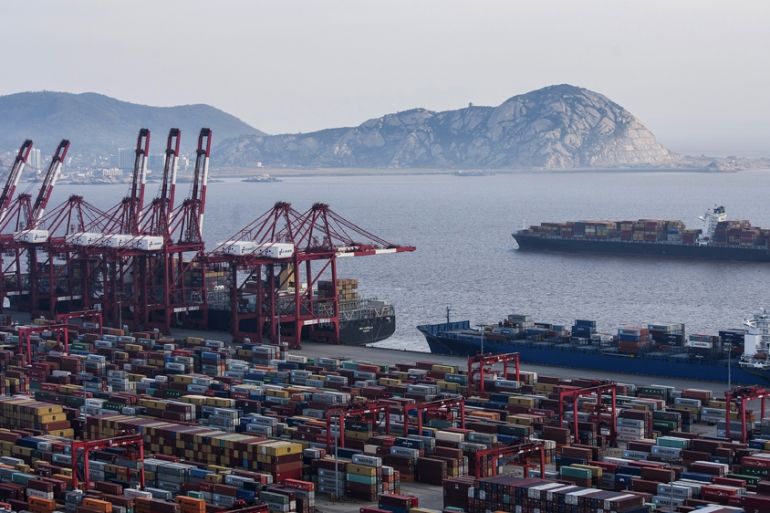Global stocks slump as US-China trade tensions intensify
China says it will impose tariffs of up to 25 percent on $60bn worth of US goods in retaliation to US levies.

A market sell-off that began in the United States spread to Asia on Tuesday as investors feared the increasingly acrimonious trade war between the US and China would hurt the global economy.
China’s main stock index, the Shanghai Composite, was down 0.2 percent in afternoon trade and has lost 5.5 percent this month. The tech-heavy Shenzhen Component Index was down 0.46 percent on Tuesday morning but rebounded by the afternoon.
Keep reading
list of 4 items‘We need you’: Solomon Islands’ support for US agency’s return revealed
Why are nations racing to buy weapons?
Parallel economy: How Russia is defying the West’s boycott
Hong Kong’s Hang Seng Index was down 1.6 percent on Tuesday afternoon.
On Friday, US President Donald Trump carried out his threat to raise import tariffs on $200bn worth of Chinese goods from 10 percent to 25 percent.
On Monday, China announced plans to retaliate against the move with tariffs of up to 25 percent on nearly $60bn of American goods.
The White House is now considering levying tariffs on another $300bn worth of Chinese consumer products.
‘Partial trade war’
Analysts say they do not see an early end to the dispute.
“Instead of a full-blown trade war, a ‘partial trade war’ that would see the two sides continue to negotiate is the more likely option,” Ronald Chan Keen Lok, Vice President at Target Capital Management, told Al Jazeera.
“The recent economic data coming out of the US and China is better than expected. That seems to give the impression that the negative impact from trade wars is not as bad as previously thought and now both nations believe they have more room to negotiate for better terms.”
The two countries are sparring over US allegations that China steals technology and pressures US companies into handing over trade secrets, part of an aggressive campaign to turn Chinese companies into world leaders in robotics, electric cars and other advanced industries.
![US Trade Representative Robert Lighthizer (right) and US Treasury Secretary Steven Mnuchin, met China's Vice President Liu He in Washington DC for trade talks last week but failed to resolve key sticking points. [Saul Loeb/AFP]](/wp-content/uploads/2019/05/580d02bc438d4470a988e0b3f05dba4e_18.jpeg)
Despite optimism from officials in recent weeks that the talks were moving towards a deal, tensions reignited last week after Trump administration officials accused China of trying to backpedal on issues already agreed to in the negotiations.
In New York on Monday, the US benchmark S&P 500 stock index fell 2.4 percent, its worst day since early January. The index is down 4.6 percent so far in May. The tech-heavy Nasdaq Composite Index fell 3.4 percent for the day, its worst decline in 2019.
Companies that depend on trade with China were hit the hardest. Tech giant Apple, which counts China as a major market, fell 5.8 percent.
Two weeks ago, hopes of a quick end to the dispute sent the S&P 500 to a record high.
Impact on China’s economy
Research firm CMC Markets in Singapore says the Chinese economy could slow down as a result of US tariffs on its goods.
“The uncertainty created by the trade war has led to businesses delaying investment and expansion plans,” said CMC Markets analyst Margaret Yang in a research note. “[The] street sees the current 25 percent tariffs on $200bn of goods will bring down China’s GDP growth by more than half a percent over the next 12 months, and over one percent if additional tariffs hit the other $325bn goods,” Yang wrote.
Some analysts say next year’s presidential election in the US could motivate Trump to bring the dispute to a close.
“If the US decides to immediately impose levies on the rest of the $325bn worth of Chinese goods, it would be a very bad scenario for the Chinese markets,” said Target Capital’s Chan.
“I doubt chances of that happening would be very high though, because it would be bad news for US companies and the country’s economy too, and Trump would not want that to happen because it would impact his re-election [campaign].”
On April 9, the International Monetary Fund cut its growth forecast for the global economy in 2019 to 3.3 percent from 3.5 percent, citing tensions between China and the US.
“Clearly tensions between the United States and China in the trade sphere are a threat to the global economy,” said IMF spokesperson Gerry Rice on Thursday. “As we have said before, everybody loses in a protracted trade conflict.”